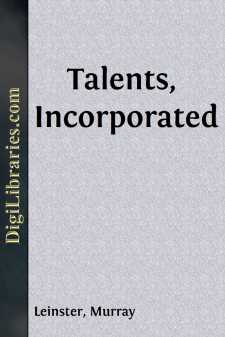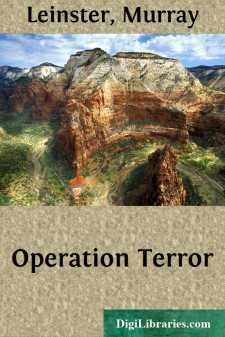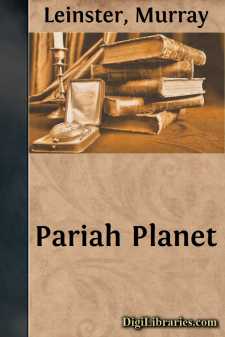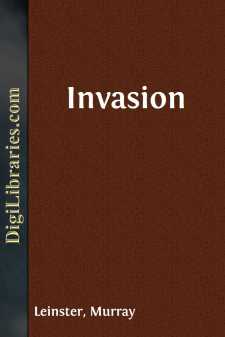Categories
- Antiques & Collectibles 13
- Architecture 36
- Art 47
- Bibles 22
- Biography & Autobiography 811
- Body, Mind & Spirit 110
- Business & Economics 26
- Computers 4
- Cooking 94
- Crafts & Hobbies 3
- Drama 346
- Education 45
- Family & Relationships 50
- Fiction 11812
- Games 19
- Gardening 17
- Health & Fitness 34
- History 1377
- House & Home 1
- Humor 147
- Juvenile Fiction 1873
- Juvenile Nonfiction 202
- Language Arts & Disciplines 88
- Law 16
- Literary Collections 686
- Literary Criticism 179
- Mathematics 13
- Medical 41
- Music 39
- Nature 179
- Non-Classifiable 1768
- Performing Arts 7
- Periodicals 1453
- Philosophy 62
- Photography 2
- Poetry 896
- Political Science 203
- Psychology 42
- Reference 154
- Religion 488
- Science 126
- Self-Help 61
- Social Science 80
- Sports & Recreation 34
- Study Aids 3
- Technology & Engineering 59
- Transportation 23
- Travel 463
- True Crime 29
Murray Leinster
Murray Leinster, the pen name of American writer William Fitzgerald Jenkins, was a prolific author known for his contributions to science fiction and pulp magazines. He wrote over 1,500 short stories, essays, and radio scripts, and is best remembered for his pioneering work in the genre, including the 1945 story "First Contact," which introduced the concept of universal translators. Leinster's innovative ideas and engaging storytelling earned him the title "the Dean of Science Fiction," and he was honored with a Retro Hugo Award for Best Novelette for "First Contact" in 1996.
Author's Books:
Sort by:
by:
Murray Leinster
There wasn’t anything underneath but clouds, and there wasn’t anything overhead but sky. Joe Kenmore looked out the plane window past the co-pilot’s shoulder. He stared ahead to where the sky and cloud bank joined—it was many miles away—and tried to picture the job before him. Back in the cargo space of the plane there were four big crates. They contained the pilot gyros for the most...
more...
by:
Murray Leinster
Part One Chapter 1 Young Captain Bors—who impatiently refused to be called anything else—was strangely occupied when the communicator buzzed. He'd ripped away the cord about a thick parcel of documents and heaved them into the fireplace of the office of the Minister for Diplomatic Affairs. A fire burned there, and already there were many ashes. The carpet and the chairs of the cabinet...
more...
by:
Murray Leinster
CHAPTER ONE Jed Cochrane tried to be cynical as the helicab hummed softly through the night over the city. The cab flew at two thousand feet, where lighted buildings seemed to soar toward it from the canyons which were streets. There were lights and people everywhere, and Cochrane sardonically reminded himself that he was no better than anybody else, only he'd been trying to keep from realizing...
more...
by:
Murray Leinster
CHAPTER 1 On the morning the radar reported something odd out in space, Lockley awoke at about twenty minutes to eight. That was usual. He'd slept in a sleeping bag on a mountain-flank with other mountains all around. That was not unprecedented. He was there to make a base line measurement for a detailed map of the Boulder Lake National Park, whose facilities were now being built. Measuring a base...
more...
by:
Murray Leinster
CHAPTER IThe Tube The generator rumbled and roared, building up to its maximum speed. The whole laboratory quivered from its vibration. The dynamo hummed and whined and the night silence outside seemed to make the noises within more deafening. Tommy Reames ran his eyes again over the power-leads to the monstrous, misshapen coils. Professor Denham bent over one of them, straightened, and nodded. Tommy...
more...
by:
Murray Leinster
CHAPTER I The little Med Ship came out of overdrive and the stars were strange and the Milky Way seemed unfamiliar. Which, of course, was because the Milky Way and the local Cepheid marker-stars were seen from an unaccustomed angle and a not-yet-commonplace pattern of varying magnitudes. But Calhoun grunted in satisfaction. There was a banded sun off to port, which was good. A breakout at no more than...
more...
by:
Murray Leinster
It was August 19, 2037. The United Nations was just fifty years old. Televisors were still monochromatic. The Nidics had just won the World Series in Prague. Com-Pub observatories were publishing elaborate figures on moving specks in space which they considered to be Martian spaceships on their way to Earth, but which United Nations astronomers could not discover at all. Women were using gilt lipsticks...
more...
by:
Murray Leinster
Detective Sergeant Fitzgerald found a package before his door that morning, along with the milk. He took it inside and opened it. It was a remarkably fine meerschaum pipe, such as the sergeant had longed irrationally to own for many years. There was no message with it, nor any card. He swore bitterly. On his way to Headquarters he stopped in at the orphanage where he usually left such gifts. On other...
more...
by:
Murray Leinster
1 To the world at large, of course, it was just another day. A different sort entirely at different places on the great, round, rolling Earth, but nothing out of the ordinary. It was Tuesday on one side of the Date Line and Monday on the other. It was so-and-so's wedding anniversary and so-and-so's birthday and another so-and-so would get out of jail today. It was warm, it was cool, it was...
more...
by:
Murray Leinster
They were broadcasts from nowhere—sinister emanations flooding in from space—smashing any receiver that picked them up. What defense could Earth devise against science such as this? Did the broadcasts foretell flesh-rending supersonic blasts? The first broadcast came in 1972, while Mahon-modified machines were still strictly classified, and the world had heard only rumors about them. The first...
more...











